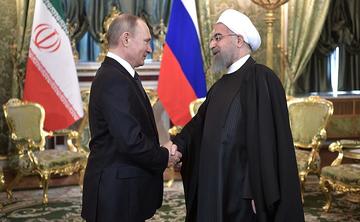Though Moscow’s stance on Iran’s regional activities might be ambivalent, Russian competition with Iran in Syria, as well as their military-defense cooperation, will afford Washington limited opportunities to rely on Russian leverage-plays with Tehran.
As Joe Biden embarks on his first weeks in office as U.S. president, an intensive debate is raging in Washington and global capitals on how to construct a Middle Eastern regional security process alongside the resumption of JCPOA, or Joint Comprehensive Plan of Action, related diplomacy vis-à-vis Iran. That debate is sustained by the frequently made assertion that it would be a mistake for Biden to return to the Iran nuclear deal, without correcting what some call its “original sins”—the deal’s failure to address Iran’s regional policies and missiles, alongside its “sunset provisions.” Experts and officials have called for a “nuclear agreement plus,” a “broader follow-on negotiation,” or a three-phased approach, to name but a few offers on today’s marketplace of Iran-related proposals. Pursuing such a broader effort will be a tall order for U.S. officials regardless of the precise format and sequencing; involving Iran’s formidable partner, Russia, in any diplomatic choreography, therefore, seems essential.
However, assuming that the Iran file could be a “low-hanging fruit” for cooperation in an otherwise strained U.S.-Russian relationship ignores Moscow’s ambivalent attitude toward Iran’s proxy activities and missile program—components of Tehran’s so-called “offensive defense” strategy. For the most part, Russia does not view Iran’s cultivation of proxy actors in Arab societies—from Lebanon via Iraq to Yemen—as a threat to its own interests. And where its views are more nuanced, as in Syria, Russia’s record of being able to rein in the Iranians is mixed at best.

For starters, Russia has consistently argued that Iranian activities in the region are unrelated to the nuclear file as a matter of principle. It has backed Tehran’s argument—especially amid the arms embargo dispute last fall—that raising issues originally considered “extraneous to the JCPOA by mutual agreement” is impermissible. That position has reflected a deeper concern in Moscow with the integrity of the P5+1 process, which affords the Russian government respect and status, but also its broader apprehensions with an alleged “rules-based international order,” in which the United States invents “rules” as it sees fit while flouting established international agreements like the JCPOA.
As a matter of practical policy, however, Russia’s view on Iran’s ties with the Iraqi Popular Mobilization Forces (PMF), the Yemeni Houthis, and the Lebanese Hezbollah is best described as a mixture of indifference and impotence. Though the recently sanctioned chairman of the PMF, Faleh al-Fayyad, has been an occasional visitor to Moscow, Russia can neither further nor contain Iran’s ambitions in Iraq—and it does not want to. Notwithstanding a desire among Russian diplomats to avoid perceptions of an exclusive alignment with a “Shia camp” in the region, given Moscow’s interests in good ties with Israel and the Arab states of the Persian Gulf, Russia lacks both appetite and leverage to meddle in Iraq’s domestic lay-of-the-land. In Yemen, claims over Moscow’s sway over the Houthis have been consistently overblown. Besides, Russia’s approach toward Yemen has been one of “strategic non-alignment,” aimed at preserving a balanced relationship with both Saudi Arabia and Iran. As such, while condemning the September 2019 Houthi attacks on Saudi oil facilities, Moscow has refused to blame Iran for its role in the war-torn country and has even blocked U.S. efforts to do so in the United Nations. And in Lebanon, Hezbollah’s entrenchment has such deep and robust roots, that it is hard to see how Moscow could tip the domestic balance of power even if it wanted to—and listening to Russia’s top diplomat serving in Beirut, one gets the impression that it doesn’t. More fundamentally, Russian interlocutors either reject the view that Iran’s proxies cause the havoc often ascribed to them from within the anti-JCPOA camp, or believe that such havoc is simply not Russia’s problem.
Read the full article here.